|
72-73 Burgate Street / Lower Bridge Street
St. Paul's
Canterbury
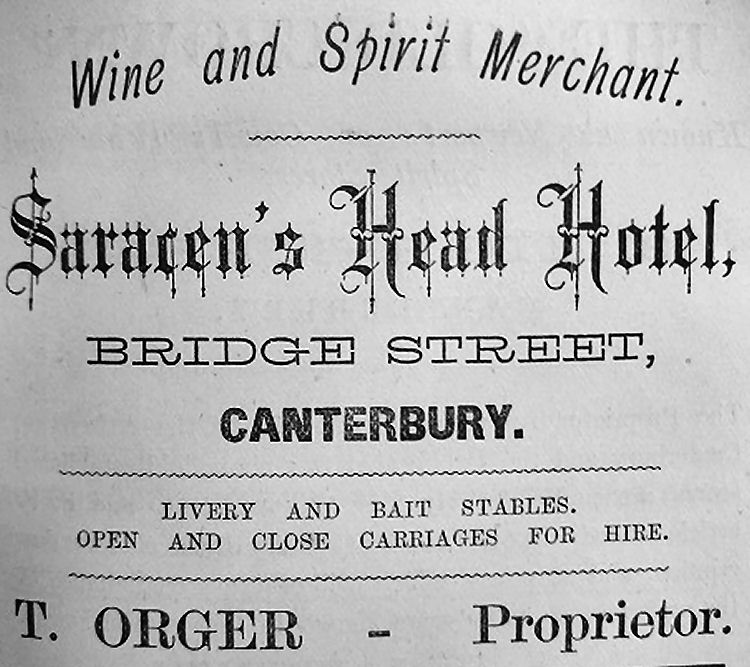
Above advert 1888. |
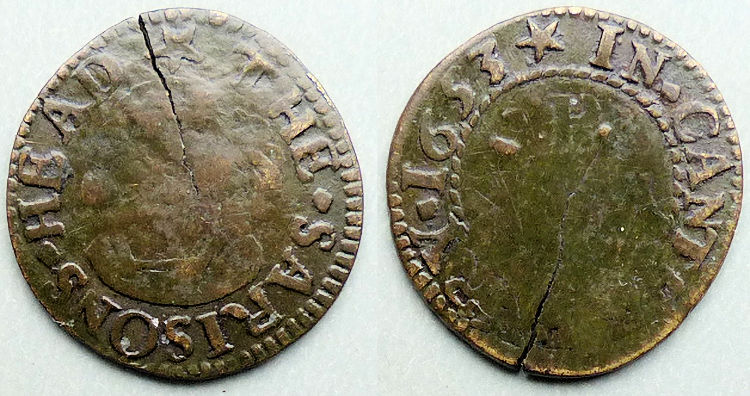
Above farthing token dated 1653. |
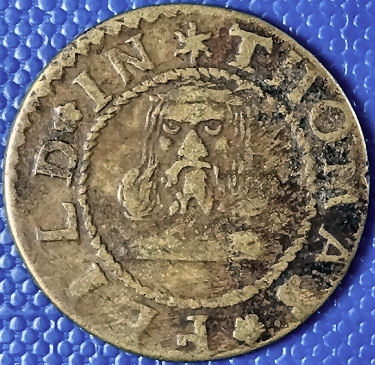 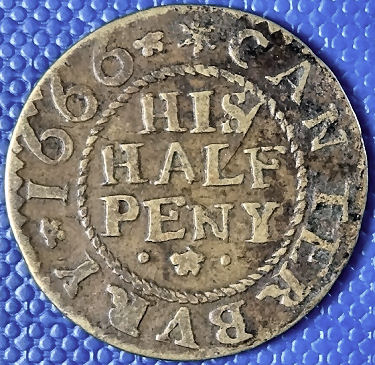
Above photo of coin dated 1666, kindly sent by Rory Kehoe. |
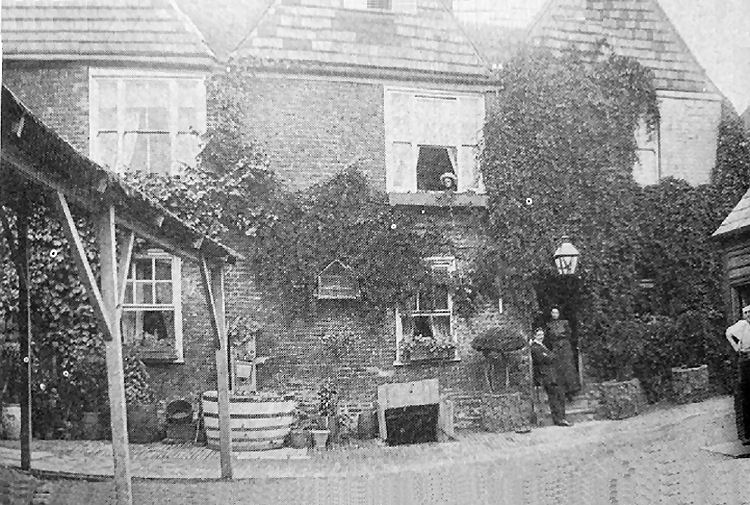
Above photo showing the back of the pub, circa 1900, kindly sent by Rory Kehoe. |
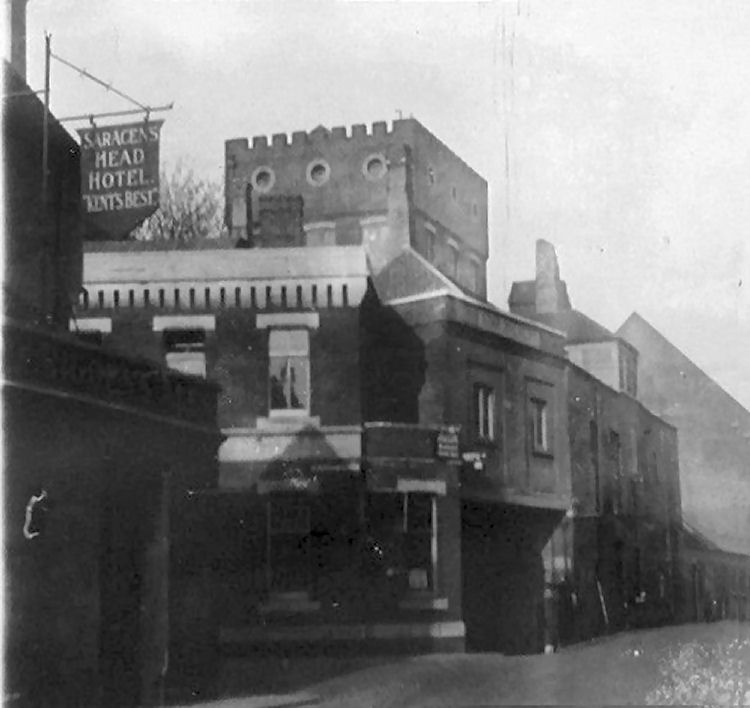
Above photo, circa 1920, kindly sent by Rory Kehoe. The pub was a
Rigden's tied pub situated right next to George Beer and Co's Star Brewery
offices, shown centre. |
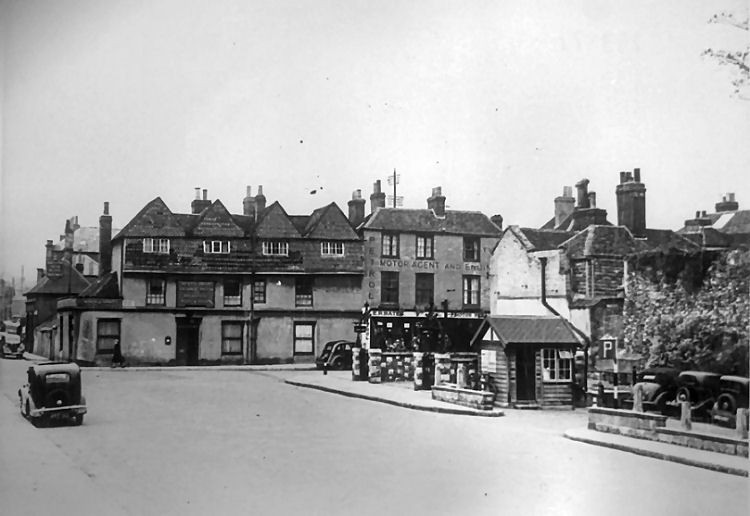
Above photo, circa 1936, kindly sent by Rory Kehoe. |

Above photo, circa 1936, kindly sent by Rory Kehoe. A view looking north
up Lower Bridge Street, with the swing sign on the left. Missing
from this image, is the large castle-like building, which stood on the
other side of the road from the pub. Previously George Beer's Star
Brewery, it had been demolished a couple of years prior to this
photograph being taken. Canterbury City Council replaced the brewery
with an underground lavatory (now the "Privy,")
and the Queningate car park. |
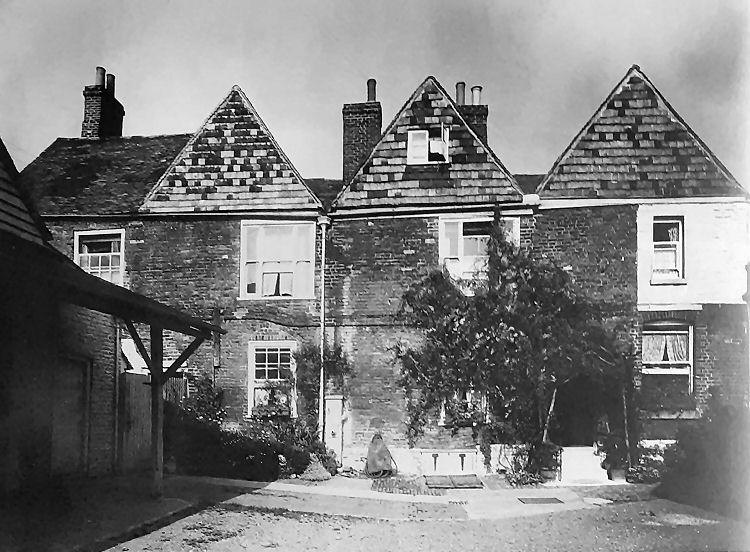
Above photo showing the courtyard in 1941. |
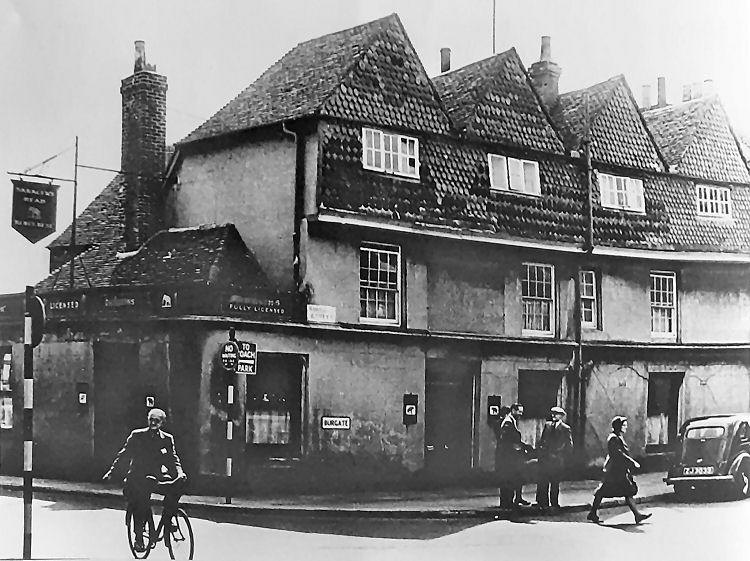
Above photo circa 1945. |

Above photo, circa 1947, kindly sent by Rory Kehoe. |

Above photo 1945, kindly sent by Rory Kehoe. Showing a Roman Catholic
Easter procession passing from Broad St. into Burgate. |
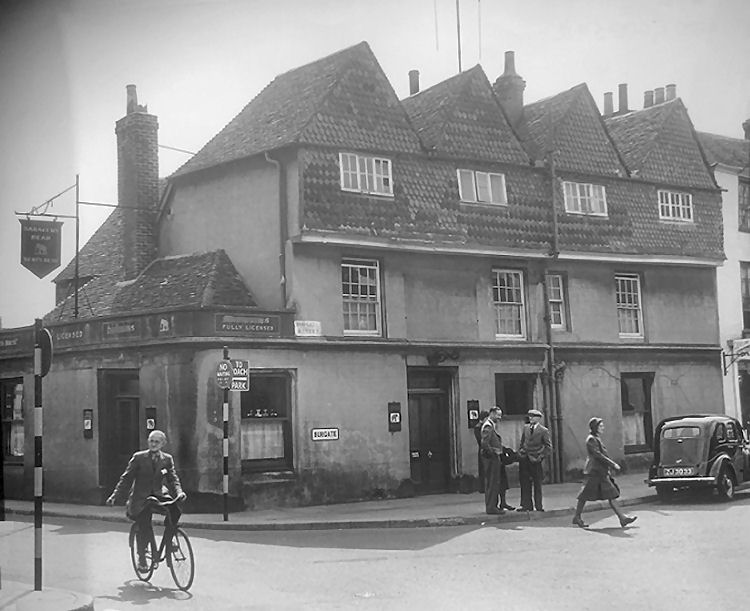
Above photo, circa 1952, kindly sent by Rory Kehoe. |
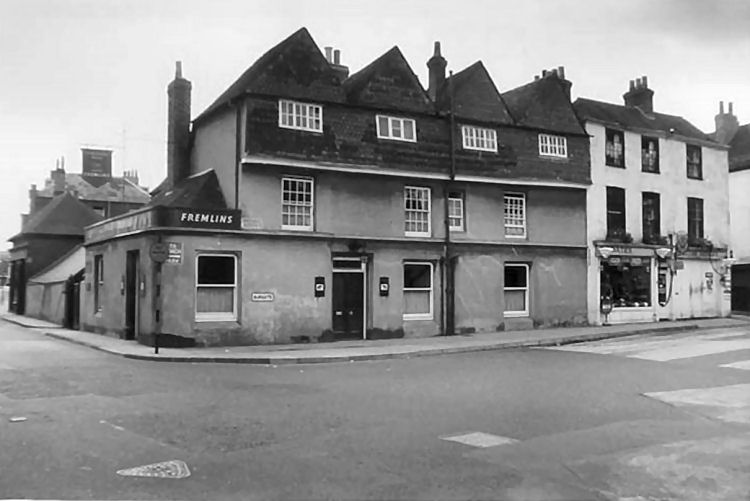
Above photo, 1961, kindly sent by Tim Timpson. |
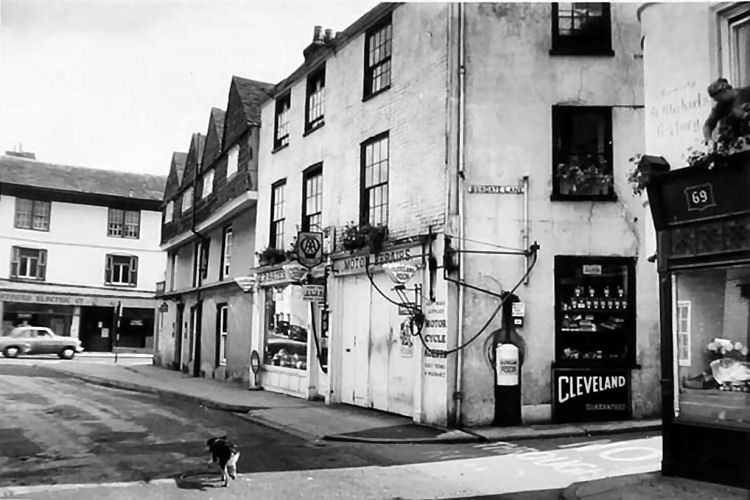
Above photo, 1961, kindly sent by Tim Timpson. |
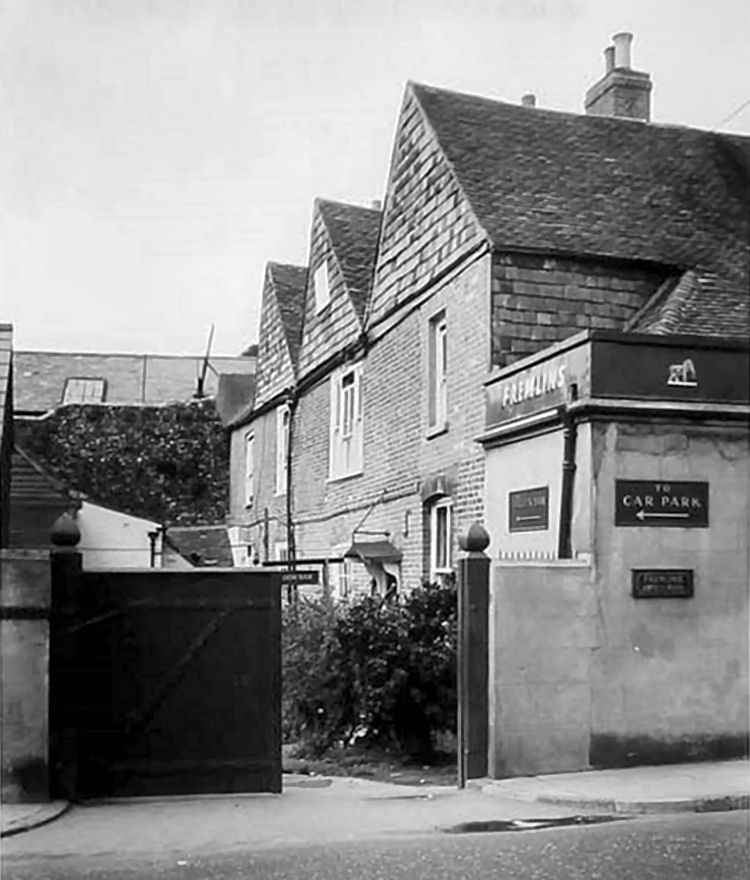
Above photo, 1961, kindly sent by Tim Timpson. |
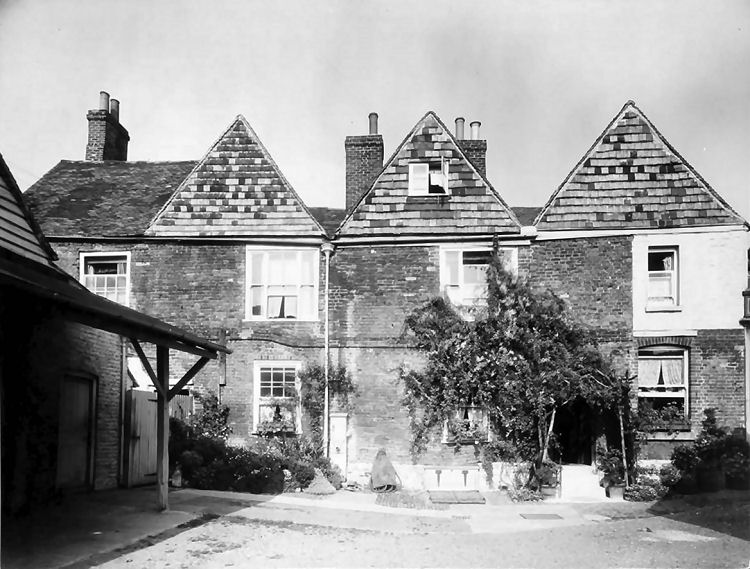
Above photo, 1961, kindly sent by Tim Timpson. |
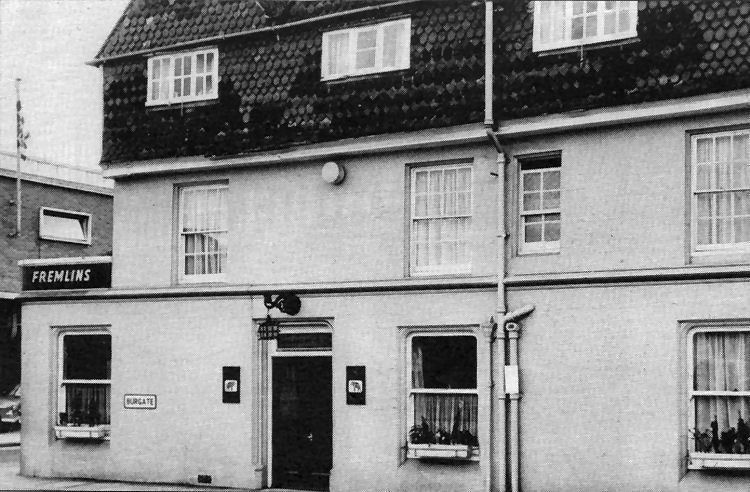
Above photograph by Edward Wilmot in 1965. |
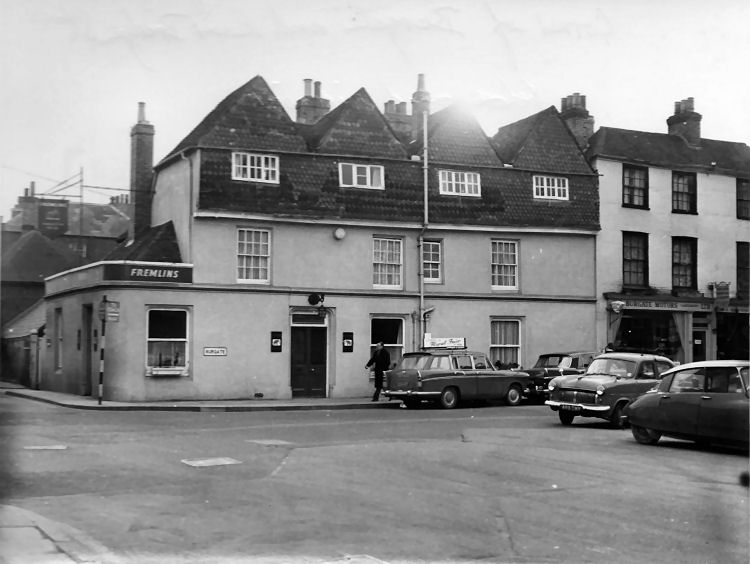
Above photo kindly sent by Robert Smith. Late 1960s. |
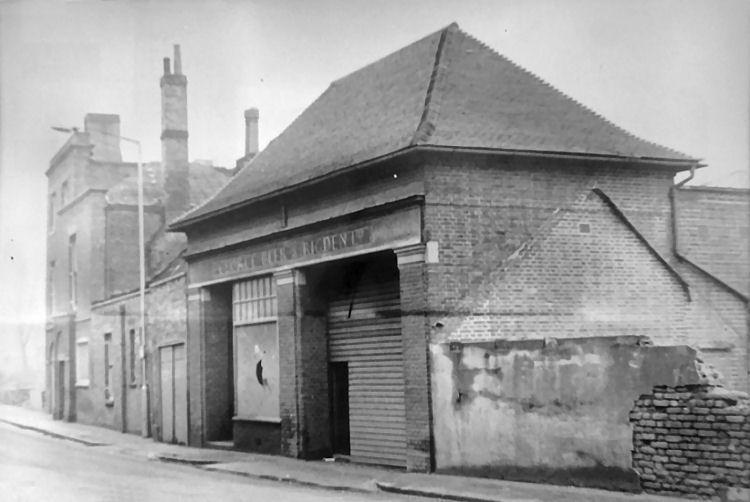
Above photo, circa 1968, kindly sent by Rory Kehoe who says:- I came across this picture, which simply had Bridge Street,
Canterbury written on the back.
I know where the building was; it adjoined the "Saracen's Head"
garden and faced Lower Bridge Street. This picture was taken facing
what's now the St. George's roundabout. I think this picture was taken
at the time when the "Saracen's Head" was about to be closed and (as
with all the buildings which were in the way of the road-widening
scheme) be demolished.
My question is:- "Was this a small George Beer & Rigden office/depot?
If not, then what was it? |

Above photo, 1968. |
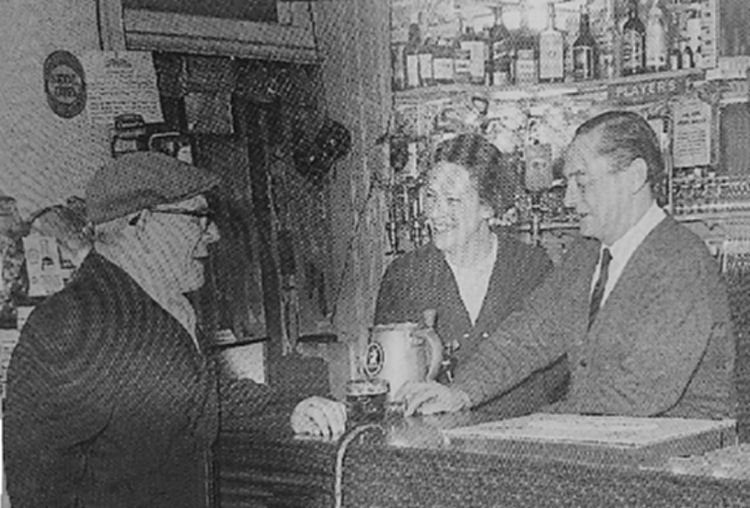
Above photo, January 1969, showing licensees Mr. & Mrs Kebbell
pulling their last pint. Kindly sent by Rory Kehoe. |
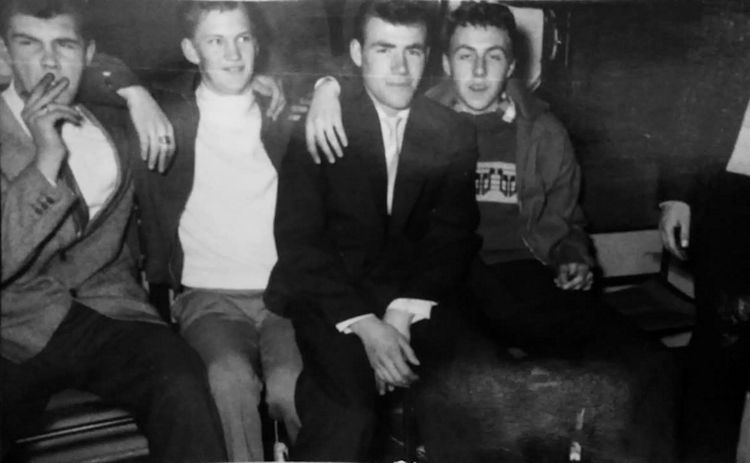
Above photo, date unknown, John Ireland, 2nd from left. |

Above photo showing the "Saracen's Head" in May 1968. The
view above shows a view down Lower Bridge Street looking towards the St.
George's roundabout.
|

Above photo, date unknown. |

Above photo, February 1969, just before demolition. |

Above photo, 1969, kindly sent by Rory Kehoe. Showing demolition in progress. |
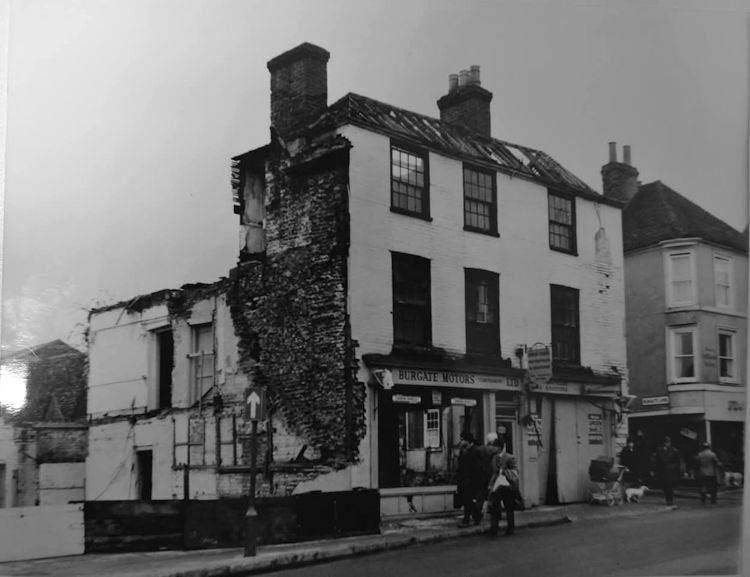
Above photo showing after demolition 1969. |
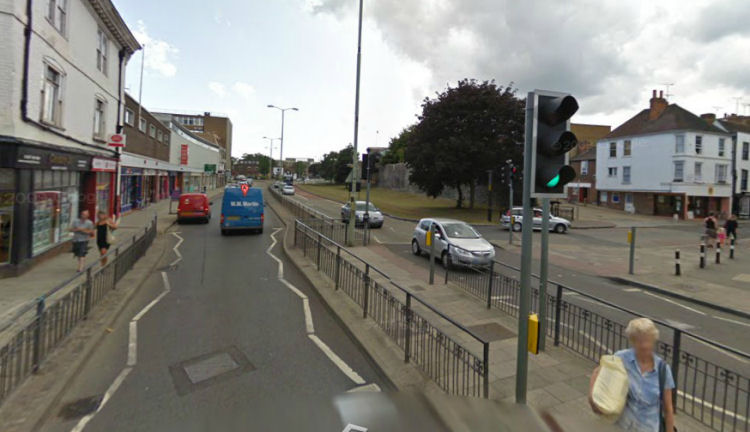
Above taken from Google July 2009, showing what I think is roughly
the same shot. |
One of Canterbury's oldest inns, this establishment was a lodging house
for pilgrims in the 15th century, standing just within the Burgate, the rear
wall being built from flints of the city wall.
Mentioned in the 1692 licensing list and the following year for billeting
6 men.
The inn hosted a Feast of woollen drapers in 1718.
In 1803 the premises was sold to Mathew William Sankey for £1,105.
|
From the Kentish Weekly Post, 8 January, 1726.
To be lett at Lady Day next.
The "Saracens Head" Alehouse, just without Burgate, Canterbury,
in the occupation of the Widow Jethery, it being a very good
accustomed house, with three very good news stables, very convenient
for County Custom, enquire of Mr. William Rigden, brewer in
Canterbury.
|
|
From the Kentish Weekly Post, 17 May 1741.
Wednesday May 20.
To the worthy FREEMEN of the City of Canterbury who are Interest if
Sir THOMAS HALES.
Gentlemen,
You are desired to meet the Friends of Sir Thomas, tomorrow Morning,
being the Day of Election, at either of the following Houses, viz.
The "King's Head," in High Street,
The "Fountain," St. Margarets,
The "Dolphin," Burgate,
The "Rose," St. Georges,
The "Black Boy," Burgate,
The "Flying Horse," Dover Lane,
The "Three Compasses," St. Peter's,
The "Golden Lyon," St. Peter's,
The "Mitre," High Street,
The "Rising Sun," St. Dunstan's,
The "Black Swan," North Gate,
The "White Swan," North Gate,
The "Tolerated Soldier," North Gate,
The "Fox and Seven Stars," St. Alphage,
The "Saracen's Head," St. Pauls,
The "Maiden Head," Wincheap,
The "Two Brewers," St. Mildred's,
The "Seven Stars," St. Alphage,
The "Three Tuns," St. Margaret's.
|
|
From the Kentish Gazette or Canterbury Chronicle, Saturday, 24 September to Wednesday, 28 September, 1768. Price 2d.
ST
OLEN
Or Strayed from the Door of the “Saracen's Head,” without Burgate,
Canterbury, on Friday Evening, between Six and Seven o'Clock, A Dark
Brown Mare, fourteen hands high more or less, Nag-tails with some Silver
Hairs, blind of the off Eve and a White streak a-cross her Breast. Who
ever will bring the said Mare to Mr. Thomas Boroman, Gardener, at
Margate, or to the Printers of this Paper, shall receive Half a Guinea
Reward, with reasonable Satisfaction for the keep.
N.B. The Mare had on a Saddle and Bridle, the Saddle almost new.
|
|
Kentish Gazette, 28 October, 1780.
To be let, and entered upon immediately, the "Saracens Head."
That old and well accustomed house, and of an easy rent.
For particulars enquiry at Mr. Jackson's Brewhouse in Canterbury.
|
|
Kentish Gazette, 28 April, 1781.
Canterbury, April 28th, 1781.
William Nisbet, begs leave to acquaint his friends and the public,
that he has taken and fitted up in a neat and commodious Manner, a
Public House, known by the sign of the "Saracen's Head," without
Burgate.
Those Gentlemen, Farmers, and others, who will please to favour him
with their company, may depend on being accommodated with genteel
Usage, good Beds, Liquors, and Stabling for their Horses, by their
most obliged and most humble Servant.
A good ordinary every Saturday.
|
|
Kentish Gazette, Wednesday 29th September 1784.
To be to the best bidder, for the most improved yearly rent, at the
Guildhall in the City of Canterbury, on Tuesday, the 5th day of October
next, at about 10 o'clock in the forenoon, the following Estates:- On
such conditions as shall be then produced.
Lot 1. All that Messuage or Tenements called the "Saracen's Head," and
Tenements adjoining, next Burgate, and the Stable, Building and Garden,
now or late occupied theirwith.
|
|
From the Kentish Gazette 6-10 January 1786
John CARLTON at The Saracen's Head "without Burgate", Canterbury.
Address for applications for a position for a young man.
|
|
From the Kentish Gazette 24-27 August 1790
JOHN CARLTON: "CAME ASTRAY:
On Tuesday evening last the 24 inst, to Mr. John CARLTON at the
"Saracen's Head," Canterbury.
A dark brown aged MARE about 14 hands
high, with a long tail. The owner may have her again by applying to John
CARLTON as above and paying for her keep and this advertisement."
|
|
Kentish Gazette 29 October 1802.
Notice.
Left at the "Saracens Head," on the 21st August, by Mr. Southby,
Riding Master, a small black Pony; if not sent for within 25 days
from the date thereof, it will be sold to defray the expenses
incurred. Canterbury, October 23.
|
|
Kentish Gazette, 29 April 1803.
SARACEN'S HEAD INN. CANTERBURY.
JOHN CARLTON, Returns thanks to his Friends and the Public in
general for their kind favours, during his residence in the above
Inn, which (on account of his going into another branch of business)
he has declined in favour of William Drury, whom he humbly
recommends to their notice.
WILLIAM DRURY, Late Butler to Sir Brook Bridges, bart.
Respectfully informs his friends and the Public in general, that he
has entered upon the above Inn, where he has laid in a stock of good
Wines and Liquors, and hopes by assiduity and attention to merit
their favours.
Good beds, well aired, and stabling.
An ORDINARY every Saturday at One o'clock.
|
|
Kentish Gazette, 11 May, 1804.
"SARACEN’S HEAD, INN, CANTERBURY.
WM. DRURY, respectfully informs his friends, and the public, his
House Warming is fixed for Thursday next, the 17th of May, instant,
when the company any Gentlemen will be considered as a particular
favour.
Dinner on Table at half past two o’clock.
|
|
From the Kentish Gazette, 13 April 1810.
Whereas a Commission of Bankrupt is awarded and issued forth against
William Drury, of the City of Canterbury, Victualler, and he being
declared a Bankrupt, is hereby required to surrender himself to the
Commissioners in the said Commission named, or the major part of
them, on the 17th and 21st days of April instant, and on the 22nd of
May next, at one o’clock in the afternoon on each day, at Guildhall,
London, and make a full discovery and disclosure of his Estate and
Effects; when and where the Creditors arc to come prepared to prove
their Debts, and at the second sitting to chose Assignees, and at
the last sitting the said Bankrupt is required to finish his
examination, and the Creditors are to dissent to, or dissent from,
the allowance of his Certificate. All persona indebted to the said
Bankrupt, or that have any of his Effects, are not to pay or deliver
the same but to whom the Commissioners shall appoint, but give
notice to Messrs. Pierce and Sandys, Canterbury, or Messrs. Wimburn
and K. Collett, Chancery lane London.
|
|
From the Kentish Gazette, 19 June 1810.
THE CREDITORS who have proved their debts under a Commission of
Bankrupt, awarded and issued forth against WILLIAM DRURY, of the
City of Canterbury, Victualler, are desired to meet the Assignees of
the Estate and Effects of the said Bankrupt,
On Thursday, the 21st day of June instant, at eleven o'clock in the
forenoon, at the Office of Messrs. PEIRCE and SANDYS, Solicitors to
the said Assignees, in Saint George’s-street, in the said City of
Canterbury, to assent to or dissent from the said Assignees
commencing and prosecuting one or more suit or suits at law or in
equity against MATTHEW WILLIAM SANKEY, of the City of Canterbury,
aforesaid, Brewer, for recovery of part of the said bankrupt’s
Estate and Effects, or to the compounding, submitting to
arbitration, or otherwise agreeing any matter or thing relating
thereto.
|
|
From the Kentish Gazette, 17 July 1810.
LOST.
On Saturday last, either in Canterbury or on the Road between
Canterbury and Wingham.
A CASE OF A GOLD WATCH. Whoever has found the same, and will bring
it lo Mr. Drury's "Saracen's Head Inn," Canterbury, will receive a
Reward of ONE GUINEA.
|
|
From the Kentish Gazette, 9 October 1810.
SARACEN'S HEAD INN, CANTERBURY.
CHARLES WILLIAMS (late of the "Phoenix," Broadstairs), respectfully
informs his friends and the public, that he has taken the "Saracen's
Head Inn", Canterbury, where he hopes by an assiduous attention, and
by keeping good wines, spirits, &c. &c. &c. to merit their
patronage.
An Ordinary on Saturdays at one o'clock.
GOOD STABLING.
|
|
From the Kent Herald, 1 July 1824.
Death.
Yesterday, after a short illness, Mr. C. Williams, landlord of the "Saracen's
Head Inn," in this city, aged 48 years.
|
|
Kentish Chronicle 11 March 1825.
Advertisement:
Public Houses at Folkestone to be sold by auction, by White and
Goulden, at the "Saracen's Head," in the city of Canterbury, on
Thursday, the 17th of March instant, at twelve o'clock at noon:
All those two valuable Public Houses, situate in the town of
Folkestone, known by the names of the "Ship" and the
"Fountain," and now
in the respective occupations of Elizabeth Huson and Edward Selden.
The situation of the "Ship" is most advantageous, as a steam vessel is
expected to start from the harbour to Boulogne, and at a trifling
expense a wharf for landing passengers, etc., may be formed, which
will render it one of the first houses in the town. The "Fountain" is
situated near the centre of the town, and has lately been put into a
complete state of repair.
For particulars apply to Mr. Charles Pitt, Conveyancer, Hawk's
Lane, Canterbury.
Immediate possession of the "Fountain" may be had.
Part of the purchase money can remain on mortgage if required.
|
|
Kent Herald 3 March 1825
Advertisement:
Public Houses at Folkestone to be sold by auction, by White and Goulden, at the
"Saracen's Head," in the city of Canterbury, on Thursday, the 17th of March instant, at twelve o'clock at noon:
All those two valuable Public Houses, situate in the town of Folkestone, known by the names of the
"Ship" and the "Fountain," and now in the respective occupations of Elizabeth Huson and Edward Selden. The situation of the
"Ship" is most advantageous, as a steam vessel is expected to start from the harbour to Boulogne, and at a trifling expense a wharf for landing passengers, etc., may be formed, which will render it one of the first houses in the town. The
"Fountain" is situated near the centre of the town, and has lately been put into a complete state of repair.
For particulars apply to Mr. Charles Pitt, Conveyancer, Hawk's Lane, Canterbury.
Immediate possession of the "Fountain" may be had.
Part of the purchase money can remain on mortgage if required.
|
|
Kentish Chronicle, 21 April, 1829.
April 14, Mr. John Carlton, aged 90, one of the brothers of St.
John's Hospital, Canterbury, and
formerly landlord of the "Saracen's Head Inn."
|
|
From the Kent Herald, 23 May 1833
Death
May 17, Mr. Thomas Nash, aged 35 years, landlord of the "Saracen's Head
Inn," Canterbury.
|
|
Kent Herald, 13 November 1845.
Saracens Head, Canterbury.
Mr Henry Epps, in retiring from the "Saracens Head", begs to return thanks to
those friends who have been pleased to patronise him; and inform the public that
he has relinquished the business in favour of his son-in-law William Carey.
William Carey.
In taking the "Saracens Head Inn," Canterbury, thanks to assure the public that
he will use the his upmost endeavours to deserve the encouragement of those who
may be pleased to patronise him.
"Saracen's Head," Nov. 1845.
|
|
Kent Herald, 20 November 1845.
Canterbury Petty Sessions. Guildhall. Before the Mayor and Magistrates.
Nov. 13. Authority granted to Mr. William Carey to keep the "Saracen's Head Inn"
until the next transfer day. Mr. Epps having removed therefrom.
|
|
Kent Herald, 27 November 1845.
Canterbury Petty Sessions. Guildhall. Before the Mayor and Magistrates.
Nov. 20. The license of the "Saracen's Head Inn" transferred from Henry Gage
Epps, to William Carey, late of Chislett, farmer.
|
|
Kentish Gazette, 9 October 1849.
FRESH CASES OF CHOLERA.
Coroner’s Inquest.
On Wednesday the coroner, T. T. DeLasuux, Esq., was called on to hold an
inquest on the body of William Cheeseman, a labouring man, aged 55
years, residing in Burgate-lane, who, with a child, had died early that
morning alter a short illness. The jury assembled at the "Saracen’s Head
Inn," and on proceeding to the house of deceased, a most appalling sight
met their view:- in the
lower room of a close and almost unventilated cottage, a boy, aged about
13 or 14 years, was writhing in severe pain before the fire, attended by
his severely afflicted mother; and in the chamber above lay the body of
the father and an infant child, and near them another child of tender
age suffering under the prevailing fatal disease. By the evidence of a
neighbour who had attended deceased, it was stated that the father was
taken ill on Monday, at which time the child was labouring under the
disorder of which both had died; that Mr. Rigden had seen and prescribed
for the child, but did not see deceased, who during the night became
more severely ill; and early in the morning of Tuesday, Mr. T. S. Cooper
was sent for, who attended. Mr. Cooper stated that he was called by the
policeman on duty, at about 2 a.m., on Tuesday, to attend deceased, and
found him labouring under the symptoms of Asiatic cholera, in its most
malignant form, necessary medicines were immediately applied which for a
time relieved the severity of the attack, and deceased rallied for a few
hours, but ultimately sank under disease. Mr. Cooper had no hesitation
in attributing the visitation of the malady in the neighbourhood, under
which several other persons are now labouring in the adjoining houses,
in a great measure to the unwholesome state of the premises, being badly
drained and ventilated, and almost surrounded with slaughter houses,
stabling, pigsties, and accumulations of dung and pestilential soil, as
described by Spratt the police inspector, who represented that the lane
beside stabling had four butchers' slaughter-houses in it, that between
the house and a wall some 15 or 16 feet high there was only a space of
three feet, very imperfect drainage, and the privies of most of the
houses in a very bad state. The jury gave a unanimous verdict of death
by malignant or Asiatic cholera, which disease had been accelerated by
the unwholesome state of the neighbourhood, and trusted the authorities
would see to the abatement of the evils complained of and presented
before them by the evidence of the Inspector. At the suggestion of Mr.
W. Solly, one of the jury, a subscription was entered into by the
Coroner, Mr. Aris, clerk to the. Justices, (who had attended as Guardian
of St. Mary Magdalen to watch the enquiry), the Jurors, and others, and
the amount presented to the poor widow to aid her in her present severe
affliction in the loss of husband and child, with the apparent
probability of a still further bereavement.
We have since learned that the poor woman has died, and also another of
the children. The remaining children have been removed to the
Union-house, and are recovering.
A young woman, of the name of Chapman, who attended on Eliza Cheeseman,
has also died of cholera.
Thomas Cheeseman, residing in Ivy-lane (the father of Wm. Cheeseman,
upon whom the inquest had been held), died on Sunday evening from an
attack of cholera that morning. An inquest was held at the "Sawyers’"
yesterday morning, when a verdict of "Died by Asiatic Cholera" was
returned.
|
|
Kentish Gazette, 12 February 1850.
£100 Mutual Assurance Society.
The annual general meeting of this society was held at the "Saracen's
Head Inn," Canterbury, (being lately removed from the "Star Inn,") on
Tuesday evening last, to appoint the officers for the ensuing year, to
receive the secretaries balance and sheet, &c. Nearly the whole of the
officers were reappointed, votes of thanks being respectively given to
those of the past year. This appears to be one of the most prosperous
societies of its kind in this city. During the evening the Secretary
reported that there had not been a death in the club for nearly 3 years;
that the sum of £200 was at interest, together with a floating balance
of £130, making a total balance in favour of the Society of £330. Some
vacancies for members were reported.
|
|
Southeastern Gazette, 14 June 1853.
Death.
May 30, aged 15 years, Emma, daughter of Mr. John Edward Bassenden,
"Saracen's Head Inn," Canterbury.
|
|
From the Kentish Chronicle, 29 August, 1863.
CANTERBURY POLICE COURT.
MONDAY. PROCEEDINGS AGAINST FRIENDLY SOCIETIES.
A gentleman from the office of Mr. Tidd Pratt, the Registrar of Friendly
Societies, attended to prosecute summonses charging Mr. Frederick Hobday,
manager of the Westgate £10 Burial Club, and Mr. James William Pilcher,
secretary of the “Saracen’s Head” £100 Burial Club, for neglecting to
forward to the registrar the annual return of the society's accounts,
previous to the 1st June last. They pleaded guilty, but Mr. Pilcher said
he had usually received a notice from Mr. Pratt to forward such return,
and had delayed sending it in consequence of not receiving the same. The
agent answered that notices had been sent to all friendly societies in
England and Wales. The Mayor told the agent that it was very sharp
practice to institute proceedings without sending the parties a
reminder that they had not furnished the return, and the Bench would
inflict the lowest fines in their power, viz. in Mr. Hobday’s case 1s.
and Mr. Pilcher’s 6d, with costs, but including only 5s. for his
personal expenses, to be paid by the former defendant.
|
|
From the Kentish Chronicle, 2 January, 1864.
CHARGE OF PERJURY AGAINST INSPECTOR DODD OF THE CANTERBURY POLICE.
Last week the Canterbury City Magistrates were engaged, for a
considerable time, in the investigation of a charge of perjury against
Charles Dodd, one of the inspectors connected with the Police Force in
the city. The magistrates on the bench were Alderman Cooper, Alderman
Phillpott, and William Musters, Esq., and as the case excited
considerable interest the Court was crowded during the investigation.
The charge arose out of a case heard before the Right Worshipful the
Mayor (Peter Marten, Esq.), Alderman Austen, and W. Masters, Esq., at
the City Police court, on Monday week, when three tradesmen—James
Callow, wool stapler, Edward Williams, tailor, and Frederick George,
tailor, were convicted of creating a breach of the peace, in Upper
Bridge-street, at midnight on Saturday week. The charge against
Inspector Dodd was preferred in the name of George.
Mr. Delasaux, in his application to the magistrates to commit Dodd for
perjury, entered into a lengthy statement of facts which he said he
could prove by the testimony of half-a-dozen witnesses. In the first
place he intended to prove that no breach of the peace had been made by
the defendants on the night in question; secondly, that they had not
loitered near Ivy-lane; and thirdly, that George had not pushed against
a woman, causing her husband to take off his coat and offer to fight
him. One feature in the case, which tended much to the disadvantage of
the defendants, George, Callow, and Williams, at the time the charge
against them was being proceeded with, was, that on their desiring to
call Mrs. Whing and Mr. Whing—the former being the woman who it was
alleged had been assaulted by George, and the latter her husband—a
constable who was despatched by order of the Court to summon them to
give evidence did not go to them, but to Whing's master, who of course
had nothing whatever to do with the affair, and declined to attend. He
(Mr. Delasaux) considered that the conviction of the defendants was an
illustration of the danger resulting from placing implicit reliance on
the testimony of police-constables when not supported by that of other
persons, and it was on public grounds that the present proceedings were
taken.
The first witness called was Mrs. Jane Whing, who stated that at about
midnight on the Saturday preceding, she, in company with her husband,
and a Mr. Bennett, was passing from Dover-lane to where she resided in
Ivy-lane. On leaving Dover-lane and entering Bridge Street, she there
saw George, Williams, and Callow. There was no disturbance that she
heard in the street. She saw two policemen. When near George and his
companions he wished them “good night.” She was not touched by George,
and neither party stopped. Her husband did not pull off his coat, and
threaten to fight George, nor did Bennett interfere to prevent his doing
so. George did not run against her and push her against the shutters of
Mr. Green’s shop.
By the Bench:- She heard no disturbance whatever. George, Callow, and
Williams were walking in the road; when she, her husband, and Mr.
Bennett passed them.
John Whing, husband of the last witness, having corroborated the former
portion of his wife’s testimony, added that he recognised Dodd as being
one of the policemen whom he saw in Bridge-street. George wished
witness, his wife, and Bennett “good night,” and they “pulled up” and
returned the compliment. George did not push against his wife, and she
did not fall against the shutters of a shop. The man did not touch her.
Witness did not take off his coat and threaten to fight George for
insulting his wife, and Bennett did not interfere to prevent his doing
so.
Cross-examined by Dodd:— I did not tell P.C. Elvy, on Sunday night that
if Bennett had not held me I should have “punched” George’s head. When
you spoke to me about the matter I said I knew nothing of it—that is, as
to hearing a noise.
Frederick Bennett likewise corroborated Mrs. Whing's evidence. He
further stated that Mr. and Mrs. Whing and himself were talking rather
loudly in the street, but beyond that there was no noise. George wished
them “good night”—that was all. When he first saw George, Callow, and
Williams, the policemen were not in conversation with them; but as
witness and party walked away he saw the constables join them.
Frederick George was next examined. He deposed that after spending part
of the evening on Saturday at the “Saracen’s Head Inn,” he left in
company with Callow and Williams, and they walked on the right hand side
of the road until they gained the top of the street near the
weighbridge, when they crossed the road. Ivy-lane abutted on the other
side of the way, and none of the party went near it. They did not stand
at the bottom of the lane and create a breach of the peace. When passing
along the street a party came towards them, consisting of Mr. and Mrs.
Whing and Mr. Bennett, and knowing them he wished them “good night.” He
did not touch Mrs. Whing, and certainly did not run against her and push
her against the shutters or door of a shop. Mr. Whing did not threaten
to fight witness for insulting his wife. Witness was on that night taken
into custody and locked up in the gaol all night, bail being refused
him.
By the Bench:— I did not stop a moment when we came up to the other
party. I merely wished Mrs. Whing “good night.”
Mr. Delasaux intimated to the Bench that he was prepared with the
evidence of Callow and Williams, which would hear out
George's statement in every particular.
The Bench did not deem their testimony essential, and after some
consideration called upon Dodd for his defence to the accusation laid to
his charge.
Dodd asked for an adjournment till Monday, to enable him to obtain legal
assistance, and after some discussion his application was granted; Mr.
Delasaux, however, being given to understand that he would be allowed to
re-open the prosecution.
Mr. Aris (magistrate’s clerk) reminded Mr. Delasaux that he had omitted
a most important part necessary to sustain the charge, viz., in not
offering to the Court, in the form of evidence, the depositions taken of
Dodd's testimony in the case against George, Callow, and Williams.
Mr. Delasaux said he should certainly obtain that evidence.
The proceedings were then adjourned to Monday.
ADJOURNED EXAMINATION.
The examination of Charles Dodd, inspector of police, on a charge of
perjury, was resumed, at the Guildhall, on Monday. The magistrates on
the bench were the Right Worshipful the Mayor (Peter Marten, Esq.), Wm.
Brock, Esq., Alderman Philpott, William Masters, Esq., and John Brent,
Esq.
Mr. Delasaux again appeared in support of the charge, and Mr. Allen
Fielding for the defence.
On the case being called, Dodd presented himself in court dressed in
police uniform, and took up his position outside the bar. Mr. Delasaux
applied that the accused should take his place inside the bar, it being
the usual practice for all defendants and prisoners to be placed there.
The magistrates then ordered Dodd to go inside the bar, and the case was
proceeded with.
Mr. Aris, clerk to the Magistrates, sworn, deposed that he was present
in the Court as clerk to the Magistrates, on the first instant, and took
down the evidence of the prisoner Charles Dodd, in support of on
information for a breach of the peace against Williams, Callow, and
George, alleged to have been committed on the 20th inst. he produced the
defendants deposition, taken by witness, and sworn to and signed by the
defendant.
On the application of Mr. Delasaux, Mr. Aris then read the prisoner’s
deposition above referred to.
James Callow, wool stapler, deposed:- I live in St. Peter’s-street, at
No. 54. On Saturday evening, 10th December, I was at the “Saracen's
Head” public house. Williams, George and others were there also. I left
the house about twelve o’clock and the others went with me. When we came
out of the house, we turned up Bridge-street, keeping on the same side
as the “Saracen’s Head.” None of us crossed over the street to the font
of Ivy lane. We went as far as the weigh-bridge before crossing over. We
then went into Upper Bridge Street. When there I saw some persons whom I
did not then know, but who I have since ascertained to be Mr. Whing,
Mrs. Whing, and a man named Bennett. They bid George good night. Nothing
further took place than George saying, “Holloa, good night.” Mr. Whing
said, “Good night, Mr. George.” Mrs. Whing also bid George good night.
They did not stop more than a second or so. Whing and his wife and
Bennett were on the pavement, and we—George, Williams, and I—were in the
road. George did not push against Mrs. Whing and knock her against the
door of Mr. Green the gunsmith. He did not touch her. Whing did not take
his coat off or attempt to do so to fight with George. Bennett, the
other man, did not prevent his doing so. I was not in a state of
intoxication. I consider that if any one was drunk, Dodd was. Before I
was taken in custody Dodd and another policeman came up, and Dodd said,
“Move on.” I said, “What for?” and he said “If you do not I will give
you into custody.” One of the parties with me—I think Williams—said “You
be ------.” We had done nothing to create a breach of the peace. Dodd
said directly “Take them into custody,”" and we were taken to the
station. When there I asked Dodd how he came to take us into custody and
he said “I have been found fault with for not doing my duty, and I will
not be found fault with no more.” I was detained in custody till five
o’clock. Dodd refused to take bail. I asked to see the Superintendent
and Dodd replied, “I am master here to-night.”
The witness was subjected to a searching cross-examination by the
prisoner's attorney, but he firmly adhered to the main facts contained
in his original statement.
Edward Williams was likewise examined, and also adduced testimony in
corroboration of that of George and Callow.
Mr. and Mrs. Whing were re-called for the purpose of being
cross-examined on behalf of the accused. The latter denied that Mr.
George had put his foot out prevent her passing.
Bennett and George were also re-called, and, after having their evidence
read over, were cross-examined by Mr. Fielding. Nothing material was
elicited.
Mr. Fielding, in addressing the Magistrates on behalf of the accused,
referred in the first place to one of the grounds on which the charge of
perjury against his client, viz., Dodd's statement as to the spot where
the disturbance took place, which he characterised as a mere quibble,
and not worth the slightest consideration. He then reviewed the evidence
of the witness called on the part of the prosecution in support of the
case and expressed his belief that the charge was got up out of
vindictiveness by the defendants in the former case.
John Richard Harden, a sawyer, living in Oaten-place, was called to
prove that on Saturday night week, he saw Callow, Williams, and George
(whom he had previously known by sight) standing at the gates near the
“Saracen’s Head.” That they were making a noise and insulted him.
P.C. Elvey:- When Bennett took hold of Whing, the latter was in the act
of taking off his jacket. Dodd and I were with Callow, George, and
Williams, ten minutes or a quarter of an hour advising them to go away
before we took them into custody. Inspector Dodd during that time was
persuading them to go away. All three made use of bad language towards
the inspector. When Dodd refused bail at the police station, Callow said
if it cost him £50, he would have his (Dodd’s) coat off. George said he
would make Dodd pay for it. On Sunday night week, I saw Whing and told
him we were compelled to take the parties into custody for making a
noise in Bridge-street. He said “Serve him well right to. If it hadn't
been for Bennett, I should have given him a hot one, and knocked him
into the street.” Callow had said to him on Thursday, “I freely forgive
you men.” I’ve no animosity against you at all.” I said, I’m
very much obliged to you, Mr. Callow.” He replied, I know the working of
things,” and walked away. He had seen Bennett, in company with Inspector
Dodd, he then said in answer to a question that he did not think Whing
would have hurt George if he had allowed him to strike him. The witness
Harden came to me and inspector Dodd on the night in question, and
complained of some men creating a noise in Bridge-street. The first
place I saw the persons alluded to was whilst they were standing at the
bottom of Ivy-lane. At time they were talking loud. They were taken into
custody in consequence of refusing to go away after interfering with the
Whing’s and Bennett.
P.C. Ells spoke to being on duty at the station when Callow, George and
Williams were brought in. George and Callow were the worse for liquor.
Williams was liberated on bail, but the applications of George and
Callow were refused on the ground that they were not fit to be
liberated. George told Dodd that he should pay for it. He saw Dodd
shortly before 12 o’clock on the night in question, and at that time he
was perfectly sober.
Mr. Delasaux with great ability replied upon the whole case. He declared
that no evidence whatever had given by the witnesses who had been called
for the defence calculated to refute the charge of perjury and he asked
the Magistrates to send the case for trial by a jury.
The Court was then cleared, and after a consultation with their clerk
for about ten minutes, the Magistrates decided on dismissing the case.
Mr. Delasaux enquired on what grounds the dismissal had been decided on.
Mr. Aris replied in consequence of the Magistrates considering the
evidence insufficient.
|
|
From the Kentish Chronicle, 16 January, 1864.
THE CHARGE OF PERJURY AGAINST INSPECTOR DODD.
Mr. T. T. Delasaux, solicitor, attended before the magistrates to apply
for a copy of the depositions taken in the case recently beard in which
Inspector Dodd was charged with having committed wilful and corrupt
perjury, in evidence given by him against Messrs. Callow and Williams,
He explained that the persons above-named were much dissatisfied with
the decision the magistrates gave not to send the case for trial by a
jury, and he had in consequence been instructed to take steps to make an
application either to one of her Majesty’s Judges or the
Attorney-General, to prefer a bill of indictment against Dodd at the
next County Assizes. He (Mr. Delasaux) was aware that he had no legal
“locus standi” (In law, standing or locus
standi is the term for the ability of a party to demonstrate to the
court sufficient connection to and harm from the law or action
challenged to support that party's participation in the case.) at the Court in making the application for the
depositions, inasmuch as no conviction having taken place he could not
demand them, but must rely on the courtesy of the Bench to concede to
his request. He believed, however, that the magistrates would, after due
consideration of the nature of the application, feel themselves
justified in granting it.
Mr. Aris, the magistrates’ clerk, reminded Mr. Delasaux that the duty of
the magistrates was to Administer justice, and that matters of courtesy
could not be entertained by them.
After some further discussion, the Bench decided not to depart from the
legal course in such cases, and refused the application for a copy of
the depositions.
Mr. Delasaux, after intimating his intention to apply to the Secretary
of State for an order to obtain the depositions, withdrew, and the
matter dropped.
|
|
From the Southeastern Gazette, 24 July 1866.
The Alleged Refusal to Maintain a Mother.
With reference to a paragraph which has obtained publicity in the
Canterbury and Dover journals, to the effect that Mr. Burch, landlord of
the “Flying Horse Inn,” Dover, had had an order made upon him to
contribute towards the maintenance of his mother, it is due to Mr. Burch
to state the following facts, which were supported by testimony adduced
before the Dover bench of magistrates, on Friday. For a period extending
over many years, Mr. Burch, through Mr. Pilch, of the “Saracen's Head,”
Canterbury, has paid his mother a sum of 3s. weekly, besides
contributing in other ways towards her support. Lately, however, the
poor woman fall ill, and by some means the attention of the relieving
officer was directed to the case, and, on a medical certificate being
granted that she required more nourishment, this was supplied to her at
a cost to the guardians of 1s. 6d. per week. Mr. Burch complains, first,
that he should have been summoned without notice; and secondly, that he
was at the time performing a duty which it was alleged he had neglected.
|
|
From the Whitstable Times and Herne Bay Herald, 11 May, 1867. Price 1d.
(Before John Brent, sen. Esq., in the chair; C. Holltum, Esq., and
Alderman Aris.)
William Constant was charged, on remand, with stealing a Horse's hood, a
rug, and a brush, from the “Saracen's Head” stables, on Wednesday, the
1st inst. The ostler stated that he saw the things safe in a stable in the
“Saracen's Head” on Wednesday afternoon, and did not miss them till P.S.
Hayward informed him that he had a man in custody on a charge of
stealing a hood, a rug, and a brash, when he went to the stable and
found the articles had been taken away. The value of them was 20s. The magistrates sentenced prisoner, who pleaded guilty, to one month in
the city gaol, with hard labour. |
|
Whitstable Times and Herne Bay Herald, 9 April 1870.
The annual dinner held at the "Saracen's Head" took place on Thursday.
Mr. George Beer occupied the chair and Mr. Alfred Beer the vice-chair.
About thirty sat down to an excellent spread provided by Mr. C. Smith.
The usual loyal and patriotic toasts were given, and altogether a very
pleasant evening was spent.
|
|
From the Kent and Sussex Courier, 6 February, 1880.
SUDDEN DEATH.
On Friday evening an inquest was held by T. T. Delasaux, Esq., Coroner,
at the “Saracen’s Head Inn.” Burgate street, on the body of Mary Guest,
aged 75. Mary Barren, wife of a pensioner stated that she had known the
deceased for about twenty years. On the previous day she was sent for to
assist deceased in moving her furniture, and went with her to a house in
Burgate street, where the deceased requested her not to leave her, as
she did not think she would be alive long. Witness sent for Dr. Rigden,
who came directly, but deceased expired about five minutes afterwards.
The medical testimony went to show that deceased died from heart
failure, and a verdict for that effect was returned by the jury.
|
|
From Historic Canterbury web site www.machadoink.com
"F. & W. PILCH,
(Successors W.J. E. Bassenden)
SARACEN'S HEAD INN,
73, BURGATE STREET,
CANTERBURY
F AND W P respectfully informs their Friends and all the Public
general, that they have taken the above OLD ESTABLISHED INN, where it
will be their .. to accommodate their Friends and all who may ... them
with a visit, is a .. that shall .. their comfort and ... Genuine
Superior Liquors of all kinds
CHOICE OLD WINES
Scotch Ales, Bottled Porter, &c, &c
Excellent Well-Aired Beds
Capital STALL STABLING and Coach House.
N.B. Cricket Bats, Balls, Leggings and every requisite for
Cricketing."
Walter M. CHECKLEY. |
Later day it offered hotel rooms for 10 up to 1968 but that year the
license was suspended following a compulsory purchase and the pub was demolished
in 1969 to make way for the ring road.
This was a celebrated old inn, removed to facilitate the widening of
Lower Bridge Street. In the 1840s the licensee was Fuller Pilch, the famous
Kent cricketer who is buried in St Gregory's Churchyard.
|
From Country Life, 19 December 1968.
A LOSS TO CANTERBURY.
How many more years will it take us to learn that if a new road
involves the destruction of fine old buildings, then the new road is in
the wrong place, or is not worth making? Canterbury is shortly to lose
the "Saracen's" Head" public house, a large 17th century house with four
gables adjacent to Canterbury's city wall; the inn is to be
demolished to make way for stage two of the city's ring road. The
Canterbury Society, which has tried for several years to find some way
of preserving the house, reports that it has finally had to admit
defeat. In recent months the society has tried to interest developers in
the idea of re-erecting the building in its original form on a new site,
but without the 19th century alterations that disfigured the ground
floor; an expert's rough estimate of the cost was £20,000, about the
same as the cost of a new building of similar size. The society also
urged the city council to provide a site and to undertake re-erection,
so that the building could be put on the market and much or all of the
expenditure recovered, but the council replied that this would involve
sanction for a loan, which would not be forthcoming in the present
financial climate. |
LICENSEE LIST
JETHERY Widow 1726+
NISBET William Apr/1781+
CARLTON John 1786-Apr/1803

?SANKEY Mathew William? 1803+

DRURY William Apr/1803-10

 WILLIAMS Charles 1810-30/June/24 dec'd
WILLIAMS Charles 1810-30/June/24 dec'd

WILLIAMS Mary 1828-29+
 
NASH Thomas 1832-17/May/33 dec'd

EPPS Henry Gage 1838-Nov/45 (age 45 in 1841 ) )
  
CAREY William Nov/1845-47+

BASSENDEN John Edward 1853+

PILCH, FULLER & WILLIAMS 1858+

PILCH William 1861-68+ (age 40 in 1861 ) )
   (also cricketer)
(also cricketer)
GIBBS Thomas 1874+

ORGER Alfred 1881-84+
 
ORGER T 1888+
CHECKLEY Walter M 1889-1903+ (age 32 in 1891 ) )
  
MACKINDER Mrs S D 1913+

JOHNSON H 1917+

GRITTEN Frederick B 1922+

KEBBELL Mr & Mrs to Jan/1969


https://pubwiki.co.uk/SaracensHead.shtml
 From the Pigot's Directory 1824 From the Pigot's Directory 1824
 From the Pigot's Directory 1828-29 From the Pigot's Directory 1828-29
 From the Pigot's Directory 1832-33-34 From the Pigot's Directory 1832-33-34
 Stapleton's
Guide 1838 Stapleton's
Guide 1838
 From the Pigot's Directory 1840 From the Pigot's Directory 1840
 From Bagshaw Directory 1847 From Bagshaw Directory 1847
 From Melville's Directory 1858 From Melville's Directory 1858
 From the Post Office Directory 1862 From the Post Office Directory 1862
 Greens
Canterbury Directory 1868 Greens
Canterbury Directory 1868
 From the Post Office Directory 1874 From the Post Office Directory 1874
 Census Census
 From the Post Office Directory 1882 From the Post Office Directory 1882
 From the Post Office Directory 1891 From the Post Office Directory 1891
 From the Post Office Directory 1903 From the Post Office Directory 1903
 From the Kelly's Directory 1903 From the Kelly's Directory 1903
 From the Post Office Directory 1913 From the Post Office Directory 1913
 From the Post Office Directory 1922 From the Post Office Directory 1922
 Inns of Canterbury
by Edward Wilmot, 1988 Inns of Canterbury
by Edward Wilmot, 1988
 Historic
Canterbury web site www.machadoink.com Historic
Canterbury web site www.machadoink.com
 Census Census
|



























